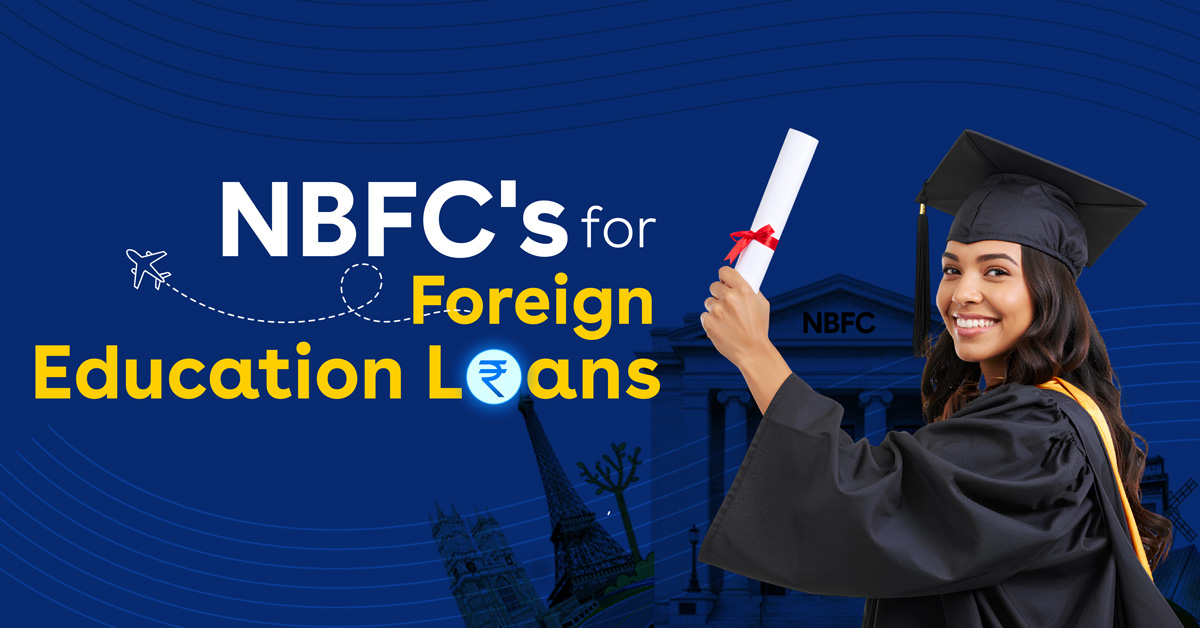Nov 07, 2022
Overseas Education Loan Terminologies: Highlights, Description & More
Planning to study abroad is exciting, a new country, new experiences, and endless opportunities to learn and grow. But before you take off on that journey, there’s one part of the process that can feel a little challenging, which is understanding the financial side of it. Fortunately, overseas education loans now make it possible for students to turn that dream into reality, even if funding feels like a hurdle.
However, when you start exploring loan options, you might come across terms and phrases that sound a little too technical or confusing at first glance. That’s completely normal; the world of finance enjoys its jargon. To make things simpler, let’s walk through some of the most common terms related to overseas education loans in a way that’s easy for you to understand.
Table of Content
|
|
Overseas Education Loan Terminologies Highlights
The table below gives you a brief snapshot of what we’ll be exploring ahead. This will make it easier for you to follow along as we unpack each term one by one.
|
|
Terms |
|
Kinds of Loans |
|
|
Interest Rate |
|
|
Eligibility & Documentation |
|
|
Processing & Disbursement |
|
|
Repayment |
|
Before getting into the intricacies of each term, it’s important to understand why knowing these terminologies is essential.
Benefits of Understanding Overseas Education Loan Terminologies
Having a clear grasp of key loan-related terms ensures transparency between you and the lender. So, let us quickly explore how being familiar with these terms can truly work to your advantage.
Helps in Informed Decision-Making: You can confidently choose the most suitable loan type and lender that aligns with your financial situation and study goals.
Prevents Miscommunication: Knowing the exact meaning of terms helps you avoid confusion when dealing with financial lenders.
Improves Financial Planning: Understanding repayment terms and interest rate structures allows you to plan your future finances effectively, even before you start repaying.
Avoids Hidden Costs: Awareness of terms like processing fees, foreclosure charges, or margin money ensures there are no surprises later.
Boosts Loan Approval Confidence: When you speak the lender’s language, you come across as prepared and financially aware. This improves your chances of smooth approval and better terms.
Now that you’ve understood the key benefits, let’s move ahead and delve into each of the major overseas education loan terminologies in detail in the following section.
Terms Related to Types of Overseas Education Loan
If you’ve ever taken a loan before, whether personal, home, or any other, you might already be familiar with some of these terms. To begin with, let’s take a look at the different types of overseas education loans.
|
|
Unsecured |
|
This collateral can be either tangible, such as property or land, or intangible, like fixed deposits (FDs), life insurance policies, or government bonds.
These loans generally come with lower interest rates and higher approval chances since the lender’s risk is minimized through the pledged asset. |
Instead, the approval is based on factors like the co-applicant’s income, credit score, academic profile, chosen course, university, and study destination.
While these loans provide flexibility to students without significant assets, they may carry slightly higher interest rates to offset the lender’s risk. |
Once you’ve decided on the type of loan that suits you best, the next step is determining how much funding you actually need, which is known as the Quantum of Finance.
It’s essential to have a clear understanding of the total amount required to cover your study and living expenses abroad. With that in mind, let’s now move ahead and explore the key terms that fall under these two major categories.
Terms Related to Overseas Education Loan Interest Rate
When you borrow a secured or unsecured education loan for abroad, the interest rate determines the additional amount you’ll pay on top of the borrowed sum. It plays a crucial role in shaping your total repayment amount and overall affordability of the loan.
To understand it better, let’s take a closer look at the different types of interest rates and other key terms associated with them in the table below.
|
|
Description |
|
Base Interest Rate/MCLR/RLLR |
|
|
Floating Interest Rate |
|
|
Floating Interest Rate |
|
|
Fixed Interest Rate |
|
|
Spread/Margin |
|
|
APR (Annual Percentage Rate) |
|
|
Simple Interest |
|
|
Partial Interest |
|
|
Compound Interest |
|
Terms Related to Overseas Education Loan Eligibility & Documentation
Though you might already be familiar with some of the basic eligibility criteria and documentation requirements, several specific terms are equally important to understand.
These terms help you know exactly what lenders look for before approving your abroad education loan and what documents you’ll need to submit during the process. Here are some of the key terms you should be aware of.
|
|
Description |
|
Loan Eligibility |
|
|
Collateral |
|
|
Offer Letter/I-20 |
|
|
LTV (Loan-to-Value Ratio) |
|
|
Credit Score (CIBIL Score) |
|
|
Co-applicant/Co-signer |
|
|
KYC Documents |
Know Your Customer (KYC) documents verify the identity and address of both the student and the co-applicant. These include PAN card, Aadhaar Card, Passport, and Utility bills. They are mandatory for all education loan applications. |
Terms Related to Overseas Education Loan Processing & Disbursement
During your overseas education loan processing journey, you’re likely to encounter several terms that might seem unfamiliar at first.
These terms are crucial as they define the stages involved from loan application to final disbursement. Refer to the table below to explore each term in detail.
|
|
Description |
|
Loan Sanction Letter |
|
|
Processing Fee |
|
|
Loan Margin |
|
|
Disbursement |
|
|
Pre-Visa Disbursement |
|
|
Post-Visa Disbursement |
|
|
Tranche/Partial Disbursement |
|
|
Disbursement Letter |
|
|
Conversion Rate (Forex) |
|
|
Loan Top-Up |
|
Terms Related to Overseas Education Loan Repayment
Whether you opt for a collateral or a collateral free education loan, repayment is an unavoidable phase of your study abroad journey. This stage begins once your course or moratorium period ends, and understanding the related terms can help you manage your finances better.
Below are some of the most important terms you’ll come across during your overseas education loan repayment process.
|
|
Description |
|
Moratorium Period |
|
|
EMI (Equated Monthly Installment) |
|
|
Repayment Tenure |
|
|
Prepayment |
|
|
Prepayment Charges |
|
|
Grace Period |
|
|
Amortization Schedule |
|
|
Co-applicant/Co-signer |
|
|
Penalty Interest/Late Fee |
|
|
Deferment Period |
|
|
Loan Waiver |
|
|
Loan Write-off |
|
Though we’ve covered all the key terminologies related to both secured education loan and unsecured education loan, understanding them can still feel a bit challenging. This especially happens when you’re dealing with financial jargon for the first time. That’s where the right guidance truly makes a difference. Instead of trying to interpret every term on your own, it’s always wiser to seek assistance from professionals who can simplify the process for you.
Élan Loans stands out as your trusted overseas education loan expert. With a dedicated team of professionals, we ensure that all your questions are answered and that you receive quick, hassle-free assistance in securing the funds you need to study abroad. From breaking down complex terms into simple explanations to helping you choose the best loan options; we’re here every step of the way.
So, why wait? Get free expert overseas education loan assistance from us today!
Overseas Education Loan Terminologies FAQs
1. Is it possible to transfer my Overseas Education Loan from one lender to another?
Yes, education loan balance transfer is possible. Many students choose to transfer their loans to another lender offering lower interest rates, better repayment terms, or improved customer service. However, it’s important to check any transfer fees or prepayment charges before making the switch.
2. Do lenders cover Living Expenses and Travel Costs under education loans?
Absolutely. Most overseas education loans cover not just tuition fees but also living expenses, travel costs, health insurance, and other essential study-related expenses. The coverage amount depends on the lender and your total cost of education.
3. Will taking an Overseas Education Loan affect my Credit Score?
Yes, it will in a positive way if you repay on time. Consistent and timely payments can significantly boost your credit score, helping you qualify for future loans or credit cards more easily. However, missed or delayed payments can lower your score.
4. How soon do I need to start repaying my Overseas Education Loan after graduation?
Most lenders offer a moratorium period that includes your course duration plus an additional 6–12 months. You usually start full EMI payments after this period, giving you time to find a job and settle down financially.
5. What if I decide to change my Course or University after getting the loan sanctioned?
If you change your Course or University, you must inform your lender immediately. The lender will reassess your loan application based on the new institution’s ranking, course duration, and expenses before approving further disbursements.

- Share this Article
Articles on Overseas Education Loans

NBFC Foreign Education Loans vs Banks
As the number of Indian students wishing to go abroad increases..Feb 02, 2026

Pre Visa vs Post Visa Study Abroad Loan Disbursement
We all can recall the scenes from heist movies...Jan 30, 2026

How Spring 2026 Intake Impacts Abroad Education Loans
With the commencement of 2026, the Spring intake starts....Jan 30, 2026

 Login
Login